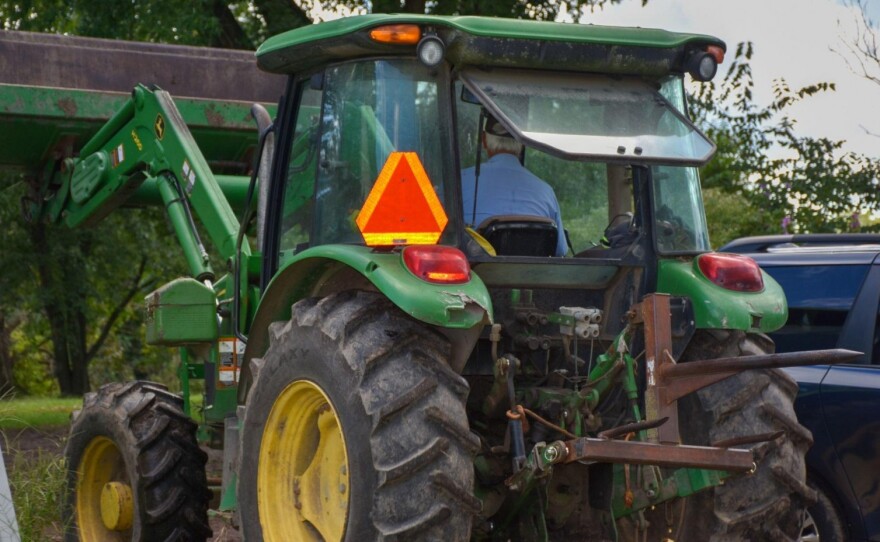Virginia has lost five million acres of farmland over the past fifty years. And while agricultural production remains high, there are fewer farms producing more product more efficiently. Where does that leave the small farm, the family farm?
Some who have farmed for generations share that they have to innovate to maintain their bottom line, especially given current inflationary pressures. Even global operations are having to answer new demands created during and since the pandemic. Yet they remain determined to succeed.
The transcript comes from this video.
TRINLEY ROBSON: I teach my little brother Remington.
ANGIE MILES: Trinley and Remington Robson groom their show cattle at the Virginia State Fair.
TRINLEY ROBSON: And then we wash, flip, dry, brush. And basically just like clean them up for shows.
ANGIE MILES: These children are the fifth generation of a Virginia farm family. They came here with their close family friend who adores the animals and with their mom.
KELLY ROBSON: They're responsible, I'm there to help them but it's their job to feed and water and wash and clip.
ANGIE MILES: Kelly Robson enjoys watching her kids learn about responsibility and master new skills. They have that opportunity here and on the family farm in Culpeper. Robson, who has a degree in agriculture from Virginia Tech came up much the same way under the tutelage of her father.
DWAYNE FORREST: I was interested in farming from the time I was a toddler. My grandfather and father actually had a farm in Connecticut. They started up there then with some arm twisting and all I got my parents to go in business with me here on this property in 73.
ANGIE MILES: Farming entails a lot of challenges and not a lot of profit.
DWAYNE FORREST: Well, 2014 was a good year. Other than that, not so good.
ANGIE MILES: And inflation is making the margins even smaller.
KELLY ROBSON: It's inflation, fuel, fertilizer and herbicide prices, labor, the price of labor is higher than it's ever been. And it's also hard to find people that have experience.
ANGIE MILES: For most of his years here, Dwayne Forrest has been a dairy farmer but he says that became much more pain than profit.
DWAYNE FORREST: I guess it was 2018 I believe I sold the dairy herd, I was losing money. It's no fun seven days a week 24 hours a day running a dairy farm and not making money.
ANGIE MILES: In fact, Forrest says there are no dairy farms left in Culpeper. Nearly all of the dairy market, he says, now belongs to the big operations.
DWAYNE FORREST: The larger dairies that are pretty much factory farms have their own nutritionists. They have their own veterinarians, and they just have to be really, really efficient.
ANGIE MILES: In addition to beef cattle Anchor Mere Farm also sells some hay and vegetables, mostly direct to customers on social media. And this is the reality for family farms, which have been disappearing by the thousands each year. America has lost more than four million farms since the late 1940s.
KELLY ROBSON: I think it's going to continue to go to either small and specialized or big. And you know the larger farmers are going to go where there's more open land, so West. Around here, I think it's going to have to get really specialized.
ANGIE MILES: Just a few miles from Anchor Mere, you'll find a very specialized farm, which is also part laboratory and part design center. Sempergreen is a worldwide operation, trying to get its footing in roofing in the United States.
OSCAR WARMERDAM: The temperature on underneath that green roof is 75 degrees naturally. The moisture and then the evaporative capacity of the plants basically, you know cool off the building. So the draw on our air conditioning is a lot less. And it looks good. We sell green roofs. That's what we do.
ANGIE MILES: Oscar Warmerdam faces the same inflation pressures as other small farmers. But he says the bigger issue is that greener, more environmentally attuned buildings are a luxury most Americans avoid. Whereas in Europe,
OSCAR WARMERDAM: Over there, people are just really like green minded. You know, my parents recycle. They have 12 bins, and they have paper and magazines and aluminum and plastics in three different colors and codes and God knows what you know. So, there's a huge effort by the public to be green.
ANGIE MILES: The solution here has been to turn these eco-friendly rooftops into advanced storm drainage systems, appealing to space- conscious Americans.
OSCAR WARMERDAM: Either a tank or some underground storage, water storage or above ground water storage. It all takes space. And if they keep the water on the roof, they can utilize that space at grade. That's what they call it and put a Starbucks there or they can park five more cars or something like that.
ANGIE MILES: Supply chain issues also block progress for Sempergreen. Warmerdam says he can't deliver product that's already sold because recipients have no one to install. But that's the story of agriculture today, managing challenges and hoping things get easier.








